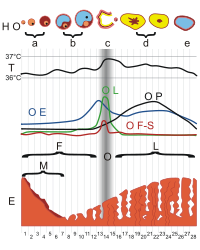
Photo from wikipedia
Introduction: Chinese herbal medicines (CHM) have been commonly used in the treatment of primary dysmenorrhea in East Asia. Several systematic reviews have been conducted to assess the clinical efficacy of… Click to show full abstract
Introduction: Chinese herbal medicines (CHM) have been commonly used in the treatment of primary dysmenorrhea in East Asia. Several systematic reviews have been conducted to assess the clinical efficacy of CHM in the treatment of primary dysmenorrhea. However, their comparative efficacy is still unclear. Therefore, the purpose of this study is to conduct a network meta-analysis (NMA) to systematically compare the advantages of different CHM in the treatment of primary dysmenorrhea. Methods and analysis: The following electronic databases will be searched in this study: Web of Science, PubMed, Cochrane Library, Chinese Biomedical Literature Database, Chinese National Knowledge Infrastructure, Chinese Scientific Journal Database, and Wan-fang Database. Search terms include (Chinese herbal medicine or Chinese patent medicine or medicinal plants or phytotherapy or traditional medicine or Chinese herbal drugs or plant extracts or herbal medicine or herbal extract or herb or traditional Chinese medicine) and (primary dysmenorrhea or dysmenorrhea or painful menstruation) and (randomized controlled trial). The language will be limited to Chinese and English, and the search date will be up to May 2019. The included studies must be randomized controlled trials (RCTs) with patients diagnosed with primary dysmenorrhea. CHM must be used as interventions in the experimental group. While in the control group, studies that used a different herbal medicine, nonsteroidal anti-inflammatory drugs (NSAIDs), or placebo will be included. The primary outcomes include clinical efficacy and visual analog scale (VAS), and the secondary outcomes include adverse events and quality of life. Four reviewers will independently extract the data and assess the qualities of the studies. Statistical analysis will be conducted with R package for each outcome. Ethics and dissemination: Ethical approval is not required as this NMA is based on published studies. The completed NMA will be published in a peer-reviewed scientific journal. Trial registration number: PROSPERO CRD42018095254.
Journal Title: Medicine
Year Published: 2019
Link to full text (if available)
Share on Social Media: Sign Up to like & get
recommendations!